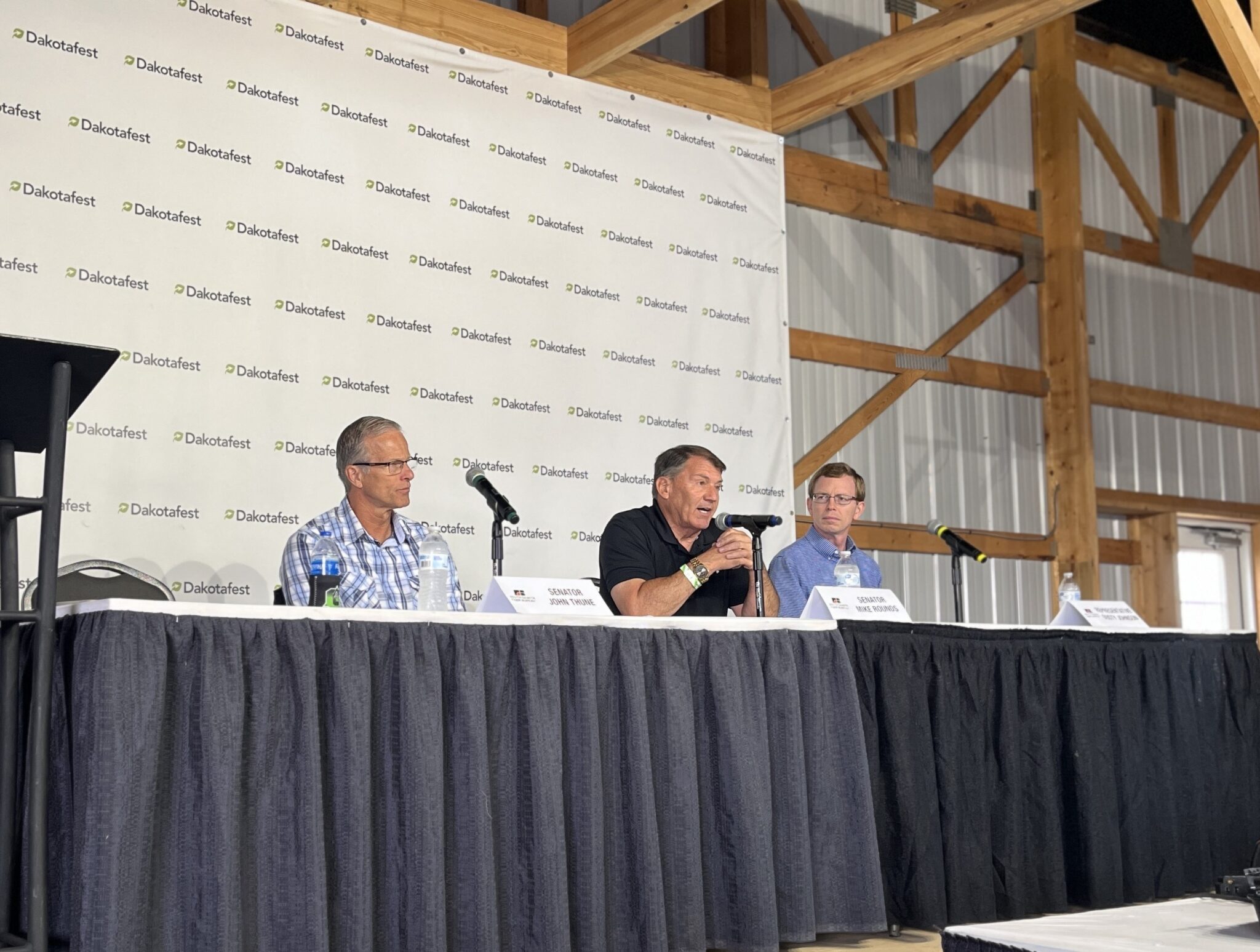
Joshua Haiar/South Dakota Searchlight
MITCHELL — U.S. Sen. John Thune, R-South Dakota, criticized former President Donald Trump’s sweeping trade policy proposals on Wednesday at Dakotafest, calling them “a recipe for increased inflation.”
“There clearly is a different philosophy that is expounded by former President Trump and some of the folks who share the view he does about tariffs,” Thune said.
A tariff is a tax imposed by a government on imported goods.
Thune made the remarks to reporters following a panel appearance alongside the rest of the state’s congressional delegation.
Trump recently called for a 10% tariff on all imports and a 60% tariff specifically on Chinese goods, policies he argues would help protect American industries from unfair foreign competition.
“What’s been suggested by some in my party is just uniform, across-the-board tariffs, and I don’t subscribe to that view,” Thune said. “I get concerned when I hear we just want to uniformly impose a 10% or 20% tariff on everything that comes into the United States.”
Thune said the blanket measures would likely backfire.
“Generally, that’s a recipe for increased inflation,” he said.
Republicans have traditionally argued that tariffs are a tax on consumers because they raise the costs of imported goods, leading to higher prices for everyday products.
Thune said targeted tariffs can be necessary to address specific threats.
“For example, our trade relationship with China, if they’re cheating, the use of tariffs in a selective way to sort of punish that bad behavior makes sense to me,” he said. “But it’s selective. They’re targeted, as opposed to uniform.”
Economists with the Committee for a Responsible Federal Budget, a nonpartisan nonprofit, estimate that Trump’s 10% tariff on all imports could raise $300 billion in revenue over a decade, or lose as much as $50 billion — depending on the share of Chinese imports replaced with domestic goods. The Tax Foundation, another nonpartisan organization, estimates the plan would shrink the U.S. economy by 1.1% and threaten more than 825,000 U.S. jobs.
The committee also says the proposed 60% tariff on Chinese imports would result in an 85% reduction in trade with China, ultimately decreasing overall federal tax revenues and causing a net loss for the U.S. government.
Thune has long been a proponent of free trade and voiced concerns about the direction of U.S. trade policy under both Democrats and Republicans. He’s said roughly 20% of jobs in South Dakota are directly tied to international trade.
During the Dakotafest panel discussion, Thune told the audience trade has been “dramatically, profoundly overlooked by the current administration.” The nation had a roughly $17 billion agricultural trade deficit last year, according to the United States Department of Agriculture.
Thune pointed out that this year’s has been estimated at $30.5 billion.
“And what that means is, we aren’t winning the war when it comes to competing and getting access for our commodities to markets around the world,” he said, which also drives down the demand for ag commodities, and therefore the price farmers and ranchers can charge.
Plus, Thune said undemocratic nations are filling the void left where the U.S. decides not to do trade.
“What’s happening, because we’re not present, is China is sucking up all the countries in the Indo-Pacific into their market, into their orbit,” he said.
Thune’s position reflects a broader division within the Republican Party over trade policy. While Trump’s protectionist approach has gained significant support among the GOP base, Republicans like Thune continue to advocate for a more free trade approach.
